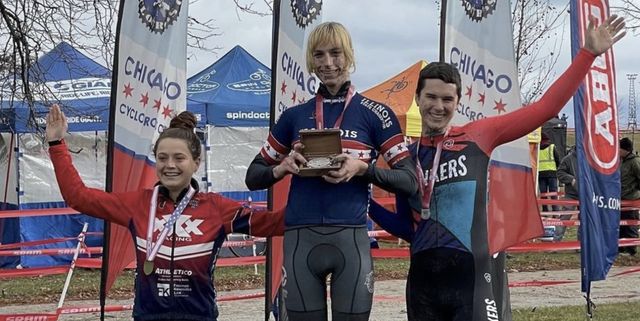
The Illinois State Cyclocross Championships took place the first weekend of December. Tessa Johnson and Evelyn Williamson took first and second place respectively, in the women’s single speed category. Kristen Chalmers took third place. It was a relatively small race in the scheme of things. But as news spread that trans women had earned gold and silver, outrage took over.
National and international publications began covering the event—but with an emphasis on the fact that the top two finishers were trans women. The Daily Mail wrote that, “Megyn Kelly simply called the incident ‘infuriating,’ while tennis legend Martina Navratilova wrote on X: ‘More mediocre male bodies taking podium places from female athletes. And it stinks!!!!’”
So Chalmers spoke up, calling out the headlines and defending her competitors and friends. Chalmers was upset not only with how people judged and sized up others, but also with how they made assumptions about her.
“The initial discourse about this race was never a good-faith, evidence-based effort to discuss policy to promote women’s cycling,” she told Bicycling. “I’d love to hear how people who claim to prioritize science and fairness deemed me a ‘true biological female’ based on a single podium photo. I never provided a birth certificate, chromosome test, testosterone level, or any of the measures used to police femininity. That’s not science, it’s sexism and transphobia.”
Chalmers went on to say, “Having images of and presumptions about my body and speculations about my reaction to the race being so publicly discussed was uncomfortable but what made it unacceptable was being painted as a victim in a narrative manufactured to fuel transphobia. While strangers’ online offers to personally pay me my ‘rightful’ $100 prize money in exchange for my boycott of future inclusive cycling events were almost comical, they demonstrated how out-of-context moments like our single-speed podium can be leveraged to keep people emotionally invested in transphobia.”
Along with her teammates, competitors, and friends, Chalmers wrote an open letter to make clear how her community works. She voiced that more people involved in sport is always better than fewer. And that she stands in full support of a larger, more competitive field—one that doesn’t exclude people.
Chalmers told Bicycling, “Within 48 hours [of writing the letter], all of the cis-women racers in the Illinois Single Speed Championships signed it, along with 56 others who race in the women’s categories of the CCC. For context, 54 women competed in the Chicago Cross Cup’s Illinois State Championship races.”
They’ve since opened the letter to signatures from racers of all gender identities, and have received support from 67 additional Chicago Cross Cup racers and 47 other cyclists.
Part of the open letter reads, “We refuse to be falsely presented as victims in a manufactured controversy driven to further alienate and marginalize those most vulnerable within our community, in service of rampant and harmful anti-LGBTQ+ legislation. We speak for ourselves: inclusion makes our sport and community stronger. Everyone is welcome here. Trans women are women.”
Tessa Johnson, winner of the single speed race, told Bicycling, “Inclusion isn’t just good for the sport, it’s the only way I see the sport staying alive.” She said, “At every race in the Chicago Cross Cup I’ve not only felt welcome, but loved. I used to be so scared about reentering the sport post-transition, fearing how people might react, but never before in my life have I felt more a part of something than where I am now.
“That’s what keeps me coming back, what keeps me pushing my friends to try it out, what makes me excited to volunteer and help my team put on more races next year, because it feels good to be a part of something, to be around those who share interests and who care about you. Compassion and community keep people involved and engaged. A diverse, inclusive community offers the best opportunity for anyone to fall in love with the sport and breathe new life into it.”
Maria Larkin, 2023 Illinois State Elite CX Champion and 2023 Irish National Champion, said, “I love racing with Tessa, we have completely opposite styles when it comes to racing and we highlight weaknesses in each other. She showed me I needed to improve my cornering and gave me confidence in my strength and fitness.
“Racing against a person who’s competitive and pushes me each week makes me a better bike racer. Having more people in our sport makes us better and adds to our community. I can’t imagine our local scene without Tessa and Casey (Evelyn) and our other trans friends. They contribute so much and I’m proud to call them my friends and my competition.”
In retrospect, for Chalmers, this issue has become much bigger than where she stood on a podium a couple weeks ago. “The opportunity to think about this over the past week with the support of other cyclists who have been advocating for inclusion for longer than I have even been involved in the sport has clarified that in the context of the Illinois Single Speed Championships, it’s pretty simple: The stakes of the championships were incredibly low, however, the reaction to our podium shows that the stakes of inclusion are incredibly high.
“Without actively resisting, the Chicago cyclocross community would have been used as a tool promoting rampant anti-LGBTQ+ legislation that threatens the rights of trans-folks, including access to life-saving gender-affirming healthcare,” she said. “Being able to say I’m a state champion is certainly not worth that cost.”

Micah Ling is a freelance writer who lives in the mountains of Colorado. She splits her free time between mountain biking and trail running.



